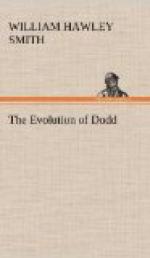CHAPTER XXIII.
On a Christmas morning, ten years after the scenes recounted in the last chapter, Mr. Bright was surprised to receive a letter addressed in “Dodd’s” well known characters. He broke the seal without comment, wondering what story of destiny he held in his hand. A thrill of joy suffused him as, on unfolding the sheets of the bulky manuscript, a bill of exchange fell upon the table. It was the most favorable sign he could have desired. It augured all that followed.
[Remark (as reads the foot-note in Scott’s bible): The first sign of regeneration in a man who has been a dead-beat is the payment of his honest debts.]
Mr. Bright opened the letter and read as follows:
New York City, December 22, 188—
Mr. Charles Bright.
Dear Sir:—Enclosed I hand you exchange, payable to your order, to the amount of $237.45, the sum due you for money advanced to me years ago, with legal interest on the same. Respectfully, D. W. Weaver.
This was the first page of the epistle, brief, business-like, and to the point. But having thus entered a voucher for his manhood, and, as it were, won the right to speak further, on the second page there was a continuation as follows:
Beloved Teacher:
What precedes will tell you where I am. You told me the last time I saw you, that if ever I redeemed myself, you would be glad to hear from me. I believe you, and hence I write.
I can never commit to paper all that I have to say to you; words spoken face to face can only tell what is in my heart; but neither the written nor the spoken word can convey to you a tithe of the gratitude I feel for all that you have done for me.
As I look back I can hardly understand how you ever bore with me as you did, with me who abused you to such unbounded lengths. Nevertheless, the more I fail to understand this, the more thankful I am to you.
I am sure you will care to know something of my career in the past ten years, and I briefly relate the principal items of interest.
And first, let me say, I have entirely quit the use of liquor. From the day when you left me in the car, limp as a whipped dog, to this very hour, I have not tasted intoxicating drink. I mention this first, because a breaking away from that habit was the first step toward a better life. Had I not stopped there, short off, I know that all hope of further reformation would have been vain. A drunkard has nothing, absolutely nothing, on which to build a new life, so long as he continues to be a slave to drink.
But with the abandonment of this vice, I began to change my other habits, and by degrees I have gained a mastery over them. It has been a long, hard fight, and I am well aware that there are battles yet to be waged; but I have reached the point where I have ceased to be afraid of myself—of my baser nature. As Cardinal Wolsey says to Cromwell: “I know myself now.” You remember we used to read the lines out of the old reader when I went to school to you at Emburg.




